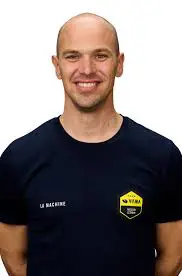Foresight
Jarno Voorintholt: Our cyclists are humans first, athletes second. Is football ready to follow?

By Jarno Voorintholt
A team riding bikes up a lonely mountain road: what could be more different from a team passing a ball across a well-tended pitch? How different are these athletes’ bodies and their biomechanical needs? How different are their vulnerabilities to fatigue, stress, and injury?
These were the questions running through my mind when I left a ten-year career in the top division of Dutch football, the Eredivisie, to join one of the world’s leading professional cycling teams, Team Visma / Lease a Bike, as their physical trainer.
But now that I have seen the innovations that professional cycling has embraced in recent years – not least in our approach to athletes’ welfare and physical conditioning – I begin to see the tools and techniques that might serve professional footballers just as well. And it’s not so much the technology itself as how we decide to use it.
Cycling and football are both experimenting with data. Both are curious about the new AI-driven tools and what they can teach us. Both glimpse a path to a new competitive edge. But here is perhaps where the differences begin.
In our pro-cycling team, we integrate a vast range of data about each of our riders – from athletic performance to rest and recovery, from heart-rate variation to daily nutrition – into a single digital eco-system. This creates a focused conversation around each cyclist, where every member of our team listens, learns, and contributes together.
In our world, there are no silos. We do not allow them.
The data we collect includes the personal, subjective feedback of every cyclist. At the end of each ride, we listen to what they experienced along the way: how did they feel at critical moments in the race? How did their bike respond to the changing conditions? How did they take their decisions?
By capturing all the intimate, nuanced human responses that a machine cannot, we build a fuller, richer picture of our athletes. We see not only performance but behaviour and feeling. Our eco-system becomes more powerful, helping us to design a clear strategy for each of our riders.
I ask myself how many professional footballers truly benefit from such an approach today – a single conversation without silos, a deeper analysis of their personal feedback, and an integrated approach to every aspect of their health, welfare, and development.
If we consider, for example, how excess workload has begun to undermine footballers physical and mental health, then we need to understand that workload has many facets; it goes far beyond what happens on the pitch.
Fatigue and stress come from other places too: from the never-ending search for sporting perfection to the normal human anxieties of personal life; from the commercial pressures of contract negotiations to the long absences from home and family.
This underlines why an athletes’ ongoing education is so important. In our cycling team, we accompany each of our riders as they explore the new data-driven tools that measure and analyse every part of their health and performance.
Our goal is not only to build trust but to allow each rider to become autonomous, so that they understand the data themselves and know how to use it. We give our cyclists agency.
Every cyclist is unique. Their biomechanical profile demands a tailored response. A sprinter who excels in time trials needs a specific approach to strength and conditioning, nutritional balance, rest and recovery. A king of the mountains needs something else.
Professional footballers would benefit from a similar approach, where we examine how their needs differ according to their position in the team and their role in the game plan. Strength, speed, and balance mean different things to goalkeepers, defenders, midfielders, and attackers. Nuance is vital.
If I look back on all our data innovations at Team Visma / Lease a Bike, and the progress which has led to victories in the Tour de France, Giro d’Italia, and Vuelta a España, one idea stands at the heart of our success: culture.
We have built our culture on a set of values that everyone shares. Together, those values remind us of who we are, what we believe in, and why we do what we do. And if there is one value that underpins every decision we take, here in our team, it is this: our cyclists are humans first, athletes second.
This is why we listen to them, build a single eco-system around them, design strategies that respond to their unique needs, and educate them in the new world of data, so that AI and its tools respond to their needs.
If it works for us, why not for football too?
